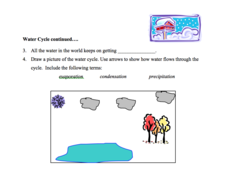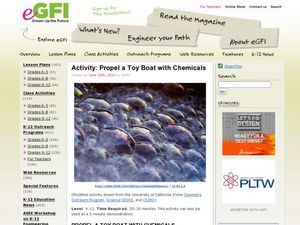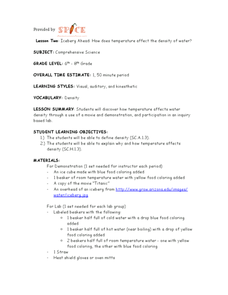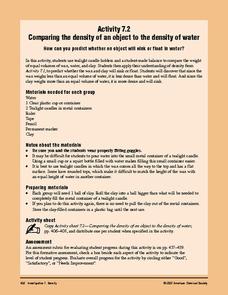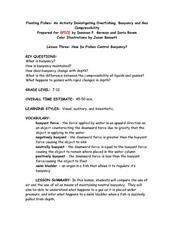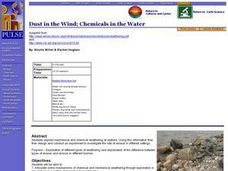Baylor College
What Makes Water Special?
Get close up and personal with a drop of water to discover how the polarity of its molecules affect its behavior. Elementary hydrologists split and combine water droplets, and also compare them to drops of oil. Much neater than placing a...
Baylor College
What Dissolves in Water?
One of water's claims to fame is as the universal solvent. Young physical scientists experiment to discover which materials dissolve in this special compound. You could never be more prepared for teaching this lesson plan than by using...
Curated OER
Water, Water Everywhere!
Learners brainstorm on ways they use water, and where water comes from. They view video, Down the Drain, to gain specific facts about water use, properties of water, problems of water and the water cycle. They perform a lab activity...
Curated OER
Investigating Properties of Water: Temperature
Investigate how temperature affects the density of water and stratification that occurs in bodies of water when temperatures vary. Water of differing temperatures is given different colors to see the layers that form. The lesson is meant...
Curated OER
Propel a Toy Boat with Chemicals
A simple cardboard or plastic boat is propelled across the surface of water when the surface tension is disrupted by adding detergent. Once youngsters see this in action, explain about the properties of water that make it possilbe:...
American Chemical Society
Using the Combining Test to Identify Unknown Liquids
Once investigators have learned how their mystery liquids interact with water during the preceding activity, they now use their observations to identify them. This is an ideal conclusion to the mini unit on the properties of water.
Curated OER
Iceberg Ahead: How Does Temperature Affect the Density of Water?
Demonstrate how ice floats on water and get the class thinking about why icebergs are so deceiving. Investigators then experiment with mixing water of the same temperature and water of different temperatures. Make sure to explain the...
Curated OER
Physical Properties of Matter
Five fabulous procedures introduce physics or chemistry classes to special properties of matter. They discover adhesion and cohesion, solubility, melting and boiling points, and viscosity through hands-on experiences. Tests are...
American Chemical Society
Comparing the Density of an Object to the Density of Water
Investigators construct a makeshift balance and compare equal volumes of wax and water. They do the same for clay and water. Then they discover whether the wax and clay will float or sink in water. Ultimately this is a comparison of...
Curated OER
Strong Ice
Through three activities, first-time physical scientists wonder at the properties of water. Freeze some soda cans and a container of water prior to the investigation to show that water expands when frozen. Lab groups experiement with...
Curated OER
Teaching About the Properties of Water
Students use video, Internet research, graphs and tables, worksheets and hands-on experiments to investigate the properties of water in a lake environment. They work under direction or through an inquiry process.
Curated OER
Solar Kit Lesson #15 - Solar-Powered Electrolysis of Water and the Hydrogen Economy
An outstanding lesson plan awaits your physics fledglings! After reading about how hydrogen can act as an energy carrier, they examine the electrolysis of water using solar power. They test the gases produced for flammability and will...
Curated OER
Water
Students conduct a series of investigations on the unique properties of water. In this general science lesson, students explain what causes water's surface tension. They explain the different stages in the water cycle.
Curated OER
Volume Lab
How can we find volume if it a shape isn't easy to measure? Investigate methods for determining this as the volume of regular and irregular objects is explored in several stations. Learners discover that when the standard formula for...
American Chemical Society
Recrystallization Test
Crystallize the answer to the question that has been investigated since the first of four lessons: What is the unknown crystal? Pupils have examined, crushed, and dissolved four samples plus an unknown as an exploration of the properties...
Curated OER
Galileo's Thermometer: Measuring the Density of Various Unknown Liquids
Sprouting scientists explore the concept of density by making mass and volume measurements for five different liquids. From these measurements, they calculate densities. They apply their learning to explain Galileo's thermometer works...
Curated OER
Effects of Water Pollution on Aquatic Organisms
Students investigate water pollution. They develop an understanding of the behavior of organisms, of the structure and properties of matter, and of natural and human induced hazards by conducting lab tests. They present their data...
Curated OER
What Are The Properties of Sea Water?
Ninth graders conduct research on the subject of sea water. They use a variety of resources to obtain information. There are helpful resource links listed in the lesson. In conjunction with the research students make inquiry of the...
Teach Engineering
Density Column Lab - Part 1
Mass and density — aren't they the same thing? This activity has groups use balance beams and water displacement to measure several objects. The pupils use the measurements to calculate the density of the objects.
Curated OER
Floating Fishes: How do Fishes Control Buoyancy?
Playing with balloons, water, oil, and bottles help put this lesson over the top! Participants use air-filled balloons in water tanks to experience gas compression. They also use oil-filled bottles to experiment with buoyancy. Included...
Curated OER
Chemical Formulas for Molecules
Newcomers to chemistry compare hydrogen peroxide to water, realizing that the difference of one oxygen atom significantly affects the chemical properties. Other pairs of compounds and their formulas are also examined. A few chemical...
Curated OER
Dust in the Wind; Chemicals in the Water
Students explore mechanical and chemical weathering at stations. They articulate some mechanisms of chemical and mechanical weathering through exploration in a lab. Students stations describe how chemical weathering differs from...
Curated OER
Thirsty Rocks: Please "Porous" a Drink!
A simple activity goes a long way in demonstrating the property of porosity to your rock hounds. They will mass a specimen of dry sandstone and then soak it in a pre-measured amount of water. After seven minutes, they once again measure...
Curated OER
The Open Ocean, What is it and How Does it Change?
Students investigate the ocean environment. In this ocean lesson, students discover the physical properties of the ocean. Over two days, students work in small groups investigating ocean maps and creating water currents.




